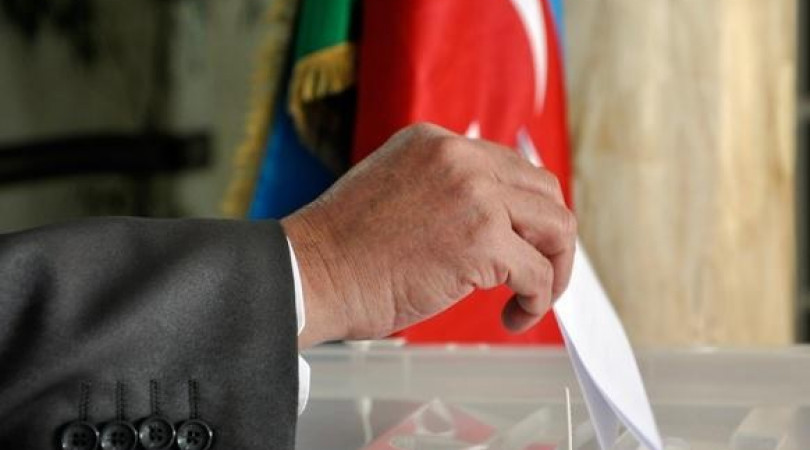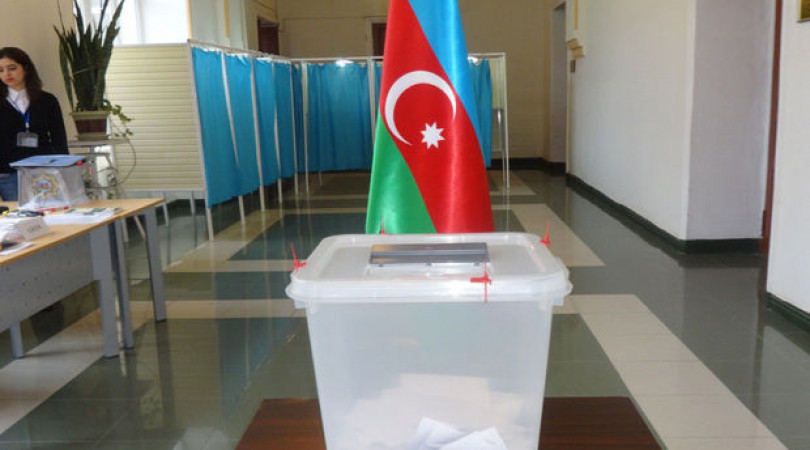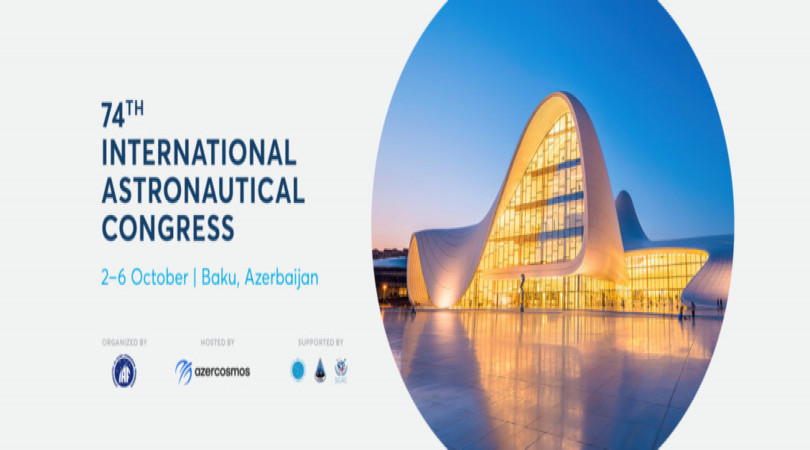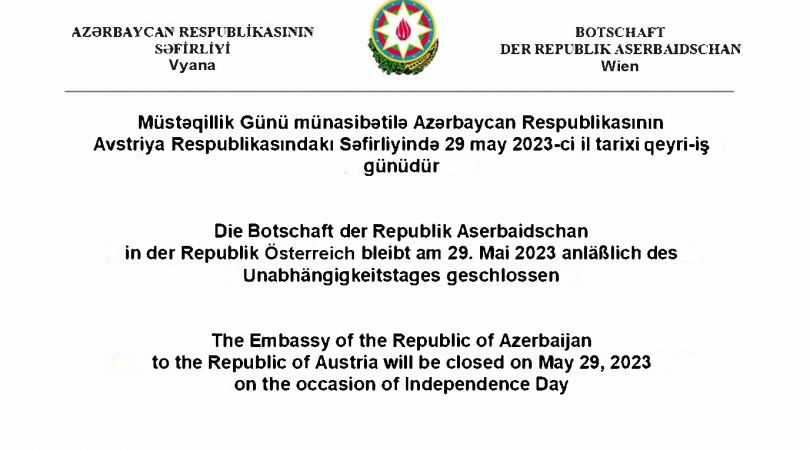Statement by the Delegation of the Republic of Azerbaijan 1282nd (Special) Meeting of the Permanent Council, 29 September 2020
Update by the Personal Representative of the OSCE Chairperson-in-Office on the Conflict dealt with by the OSCE Minsk Conference
Mr. Chairperson,
To begin with, we express our disappointment that the Albanian Chairmanship decided to call this special meeting of the Permanent Council without prior proper consultations with Delegation of Azerbaijan.
I would like to draw attention of the Permanent Council to yet another large-scale military provocation by Armenia against Azerbaijan along the frontline. In the morning of 27 September 2020, the Armed Forces of Armenia opened fire and attacked the positions of the Armed Forces of Azerbaijan, using large-caliber weapons, mortar launchers and artillery. As a result, there have been casualties among the civilians and military servicemen of Azerbaijan. Substantial damage has been inflicted upon the private and public properties and infrastructure. As of today, 12 civilians, including two children were killed. Five of them were members of one family. 35 civilians were seriously wounded.
As was the case in April 2016 and most recently in July 2020, Armenian Armed Forces deliberately target civilian population and infrastructure in violation of Armenia’s obligations, fundamental norms and principles of international law, including international humanitarian law. As we speak Armed Forces of Armenia continue artillery shelling of densely populated areas inside Azerbaijan, adjacent to the front line. 150 residential buildings were destroyed. The fact sheet has been distributed under reference number SEC.DEL/394/20.
In order to repel military aggression by Armenia and ensure the security of civilians and densely populated residential areas deep inside the internationally recognized territories of Azerbaijan, the Armed Forces of Azerbaijan undertake counter-offensive measures within the right of self-defense and in full compliance with the international humanitarian law. Azerbaijan acts on its sovereign soil, and takes adequate and proportionate measures necessary to repulse the imminent threat to its sovereignty and territorial integrity, and security of its civilian population.
Due to the continued occupation by the Armed Forces of Armenia of the Nagorno-Karabakh region and adjacent districts of Azerbaijan as well as armed attacks and military provocations against Azerbaijan, the President of the Republic of Azerbaijan has declared a martial law in the country starting from 00:00 on 28 September 2020, in accordance with the relevant provisions of the Constitution of the Republic of Azerbaijan.
The act of aggression by Armenia against Azerbaijan is yet another blatant violation of fundamental norms and principles of international law, international humanitarian law, including the Geneva Conventions of 1949 and its Additional Protocols, as well as the UN Security Council resolutions 822, 853, 874 and 884 of 1993, demanding the immediate, complete and unconditional withdrawal of the armed forces of Armenia from the occupied territories of Azerbaijan, as well as the UN General Assembly resolution A/RES/62/243 entitled “Situation in the occupied territories of Azerbaijan”.
This armed attack is not an isolated or sporadic act, but is part of Armenia’s widespread and systematic policy of the use of force and should be considered in the context of consistent attempts by the leadership of Armenia to derail the peace process by resorting to irresponsible statements and actions. These are the continuation of the latest provocations of the Armenian side, including its armed attack in the direction of Tovuz district on 12-16 July 2020, the sabotage-reconnaissance group’s provocation in the direction of Goranboy district on August 23, illegally changing the demographic, cultural and physical character of the seized lands, including by settlement of the Armenian population into these territories, engaging in unlawful economic and other activities there, as well as other provocative statements and actions of the Armenian leadership.
In the interest of time, I will not list all these warmongering statements and actions of the Armenian leadership. The Delegation of Azerbaijan has distributed among the participating States the non-exhaustive compilation through the document with reference number SEC.DEL/373/20. Today, I will focus on some of these notorious actions, their consequences and implications for the conflict settlement process and the way forward.
Despite certain expectations, the calm situation along the front line since at least September 2018, did not result in progress in the negotiations. On the contrary, notwithstanding certain intensification in frequency of meetings between Armenia and Azerbaijan, the lack of political will of Armenia to resolve the conflict further crystallized into an open defiance to any kind of progress in the process of political settlement of the conflict. Instead of delivering on its commitment to prepare its population for peace, the Armenian leadership replicated its predecessors’ policy, both in words and deeds and went even further in derailing beyond repair the peace process. Armenian Prime Minister’s statement that “Karabakh is Armenia”, stand as the most serious blow to the negotiation process. Most recently, he put forward unacceptable and groundless so-called seven conditions to Azerbaijan, including his new invention, so-called “self-determination without limitations”, which has nothing in common in international law and the OSCE principles and commitments and run contrary to the UN Security Council and the OSCE decisions on the Armenia-Azerbaijan conflict.
Armenia continuously challenges the format of negotiations by attempting to introduce the unlawful puppet regime it established in the occupied territories as party to negotiations. The Armenian senior officials publicly denounce their adherence to the logic and understandings underlying the OSCE Minsk Group-led negotiation process for years. They reject the step-by-step approach in the conflict settlement and misinterpret the key OSCE documents and decisions on the conflict settlement and the principles of the Helsinki Final Act.
These statements and actions vividly demonstrate that this country chose not to seize the opportunity to engage constructively in the negotiations and desperately tries to derail the peace process at all cost to prolong the occupation of the territories of Azerbaijan with a view to imposing a fait accompli.
Let me reiterate once again that the step-by-step approach, addressing in the first stage elimination of the major consequences of the conflict, starting with immediate, complete and unconditional withdrawal of the Armenian armed forces from the Nagorno-Karabakh region and other occupied territories of Azerbaijan, is based on the relevant UN Security Council resolutions and the OSCE decisions, in particular the Helsinki Additional Meeting of CSCE Council of 1992, the Budapest Summit decision of 1994, which define the mandate of the Co-Chairmen of the OSCE Minsk Group and provide political and legal framework for the resolution of the conflict. These are consensus-based decisions of the OSCE endorsed by the relevant UN Security Council resolutions and are not subject to re-negotiation. We have repeatedly warned our interlocutors that deviation from this established framework of negotiations is a serious blow to the entire peace process, and must be properly addressed by the international community, in particular the OSCE Minsk Group Co-Chairmen.
There were statements that there is no military solution to the conflict. We also would like to believe that. But, while making such statements, one should also look at what are the impediments to the political resolution to the conflict, what are the obstacles for eliminating its consequences, what steps must be taken to address them? Are we moving in the right direction? Are we, the OSCE pS doing enough to implement our own decisions? In response we hear deafening silence.
The lack of adequate reaction of the international community, including the OSCE, to irresponsible, warmongering statements and aggressive actions by Armenia, notorious double standards and selective approaches in application of the principles of the Helsinki Final Act, only contributed to this country’s sense of impunity and permissiveness that led to the Armenian adventurism two days ago.
I am addressing today those who called for ceasefire and resumption of serious, substantive negotiations. I will take this opportunity to dwell upon the issue of cease-fire, referred to by the representatives of EU (including aligned countries), the Russian Federation, the United States of America, France, Canada, Norway, Switzerland, United Kingdom, Kazakhstan, Greece, Italy, Belarus, Georgia, Cyprus and OSCE PA, since the practice of previous years shows that their interpretation of ceasefire is provided in a very narrow sense.
First, the ceasefire must be respected and implemented fully and unreservedly. One cannot demand to abide by a ceasefire regime to the extent it fits its interests, but ignore its violations when it is not. We have repeatedly brought to the attention of the international community that the continuation of the conflict and illegal presence of the Armenian armed forces in the occupied territories of Azerbaijan remain the main cause for violation of ceasefire regime and escalation of the situation. The 1994 cease-fire is stemming from and is based on relevant UN Security Council resolutions. The UNSC resolution 822 of 1993 sets explicit connection between cessation of all hostilities by establishment of a durable cease-fire and immediate withdrawal of all occupying forces from the occupied territories of Azerbaijan. 1994 cessation of fire and of all military activities in the conflict zone required both sides to pursue a set of specific measures such as withdrawal of troops from the occupied territories, deployment of international observers, restoration of communications, return of displaced population and continuation of negotiation process. Therefore, the ceasefire accord established a clear linkage between the cessation of fire and military activities, on one hand, and the withdrawal of the Armenian troops from the occupied territories, the restoration of communications and the return of internally displaced persons to their homes, on the other. Similar elements are reflected in relevant OSCE documents of 1992, 1994 and 1996 with a slightly different wording.
So, we have to be clear that these measures and linkages between them have to be considered in their entirety and not by singling out one element. One cannot demand to respect the ceasefire regime limiting it scope of application only to exchange of fire across the frontline from different types of weapons. Violations of the cease-fire include such instances as attempts to consolidate the occupation of territories, entrenching and building-up military positions, transferring military equipment and hardware to these territories, conducting large-scale military exercises, refusing to withdraw from the occupied territories, denying the return of IDPs to their homes of origin. These are the major elements of the policy and practice that Armenia openly pursues over last decades in direct violation of the cease-fire accord. However, we have not heard for decades any condemnation of these violations of the cease-fire regime neither in the OSCE, nor in public.
Second, a ceasefire, even when longstanding, is not meant to last forever. It is meant to be a springboard for diplomatic action to resolve politically the conflict. I wish to stress that in the ceasefire accords, Azerbaijan and Armenia reaffirmed their commitment to accelerate and intensify the negotiations for the conclusion of a political agreement on cessation of the armed conflict. This commitment is a key element and an integral part of the ceasefire regime, which identifies its overall purpose. The cease-fire regime can hardly be sustainable, if there are no substantive negotiations towards resolution of the conflict. Refusal by the Armenian leadership to engage in substantive talks accompanied by extremely provocative and bellicose statements undermined the negotiations. That was the main reason behind failure of the cease-fire. Recent escalation proves this relationship.
As far as calls to substantive negotiations are concerned, they must have concrete objectives, outcomes and outputs as identified by the UN Security Council resolutions and the OSCE decisions. We have not seen this clarity as to what are the objective of the Minsk Process and the concrete outputs for the Minsk Group to achieve those. When we wanted to clarify these objectives, including through the Unified Budget process, we faced resistance of the Co-Chairing countries, HLPG and PR CiO office. Instead, we are offered to discuss vague conditions conducive to resumption of negotiations, which in itself is a precondition. We have seen since at least September 2018 an unprecedented calm along the frontline. Did it result in substantive result-oriented negotiations and any progress that we could register?! The answer is no.
Azerbaijan has consistently stated that the current status-quo and tensions along the front line do not serve its interests and it is the most interested party in finding a soonest, durable solution to the conflict. However, the Armed Forces of Azerbaijan will not sit idle and will respond adequately to provocations and cease-fire violations of Armenia. It should be made clear that neither the 1993 UN Security Council resolutions nor the cease-fire divested Azerbaijan of its inherent right of self-defense under Article 51 of the UN Charter that solidified once and for all, in view of the continuing aggression by Armenia and occupation of our territories, determined by the UN Security Council as unlawful.
Under the above-mentioned circumstances, Azerbaijan is compelled to defend its citizens and its territory against the armed aggression of Armenia. Azerbaijan’s position is impeccable both from legal, political and moral points of view as it acts within its internationally recognized territory in response to the external armed attack by Armenia and in absence of condemnation of the occupying power and lack of effective mediation efforts by the OSCE Minsk Group.
Our military objectives are to protect and to prevent further loss of life of innocent Azerbaijani civilians by neutralizing illegal presence of the Armenian armed forces in the occupied territories of Azerbaijan and to achieve a sustainable and durable peace in our country and region.
I wish to inform the Permanent Council that the Azerbaijani Armed Forces have successfully started to implement the tasks outlined by the President of Azerbaijan and have liberated part of the occupied territories of Azerbaijan.
The Administration of President, the Defense Ministry and Ministry of Foreign Affairs of Azerbaijan has been providing regular press-briefings and updates on the military counter-offensive operation carried out along the entire perimeter of the Line of Contact in full compliance with international humanitarian law, in particular the Geneva Convention of 1949 and its Additional Protocols.
It should be stressed that speculations about mercenaries being used and a third party involvement into the military operation on the side of Azerbaijan have no ground. The only force that is conducting the military operation is the Azerbaijani Armed Forces. Morale and motivation of the Azerbaijani Armed Forces and Azerbaijani people is very high and determination of our nation to liberate our occupied territories is unflinching.
Azerbaijan is resolutely determined to continue the counter-offensive operation until its sovereignty and territorial integrity is fully restored and threats and risks to safety and security of Azerbaijani people are eliminated. Once the Armenian Armed Forces’ illegal presence in our territories will be eliminated, Azerbaijan will be ready to engage in dialogue with partner countries and international community in reconstruction and rehabilitation efforts of the conflict-affected territories. We hope that at that stage the region can be exposed to more opportunities for cooperation and development.
Azerbaijan would like to sincerely thank those countries and international organizations who extended their principled and resolute support to Azerbaijan in its just cause and fight for the Patriotic War. This was a serious test for our friendship, supremacy of international law and Azerbaijan will never forget your backing. Especially, I would like to extend my gratitude to the people and Government of brotherly Turkey who on various levels stood together with Azerbaijani nation on this path. We are proud to have such ally and brotherly country as Turkey standing together with Azerbaijan for justice and security.
Azerbaijan understands that a road to the neighborhood free of conflict and occupation could be thorny, deeply painful and sorrowful for the neighboring Armenian people whose generations has been led astray by the previous and current regimes’ dreams of territorial expansionism based on the discrimination against Azerbaijanis. However, the Azerbaijani nation has been patient enough with continued occupation of its territories and pinned its hopes on the change of the mindset of the current Armenian regime, including with support of the Minsk Group. Unfortunately, these expectations have not realized and we see no other way to restore Azerbaijan’s infringed territorial integrity. The Azerbaijani nation, like many other countries in the world, seeks no land of its neighbors, but will not yield an inch of hers to anyone.
There is still a remedy for the current generation of Armenians to avoid a massive loss of lives through ensuring an immediate, complete and unconditional withdrawal of the Armenian Armed Forces from the occupied territories of Azerbaijan. This is a demand of the UN Security Council. Azerbaijan calls on those countries who spoke in favor of establishing a cease-fire to persuade the Armenian leadership to abandon its revanchist and populist policy and to spare thousands of lives.
We hope to see that the OSCE Minsk Group would at least be able to fully understand the seriousness of intention of Azerbaijan and will call on Armenia to withdraw its troops from the occupied territories and to allow peace to return to the region.
Until that happens and we clearly see the Armenian troops leaving the territory of Azerbaijan, we will continue our legitimate military operation and will keep updated the Permanent Council on development on the ground in due course.
The Republic of Azerbaijan reiterates that the military occupation of the territory of Azerbaijan does not represent a solution and will never produce a political outcome desired by Armenia. The resolution of the conflict is possible only on the basis of the norms and principles of international law, as enshrined in the Helsinki Final Act, in full respect for the sovereignty and territorial integrity of the Republic of Azerbaijan within its internationally recognized borders. Azerbaijan considers no political solution to the conflict beyond this framework and participates in the settlement process based on this understanding.
The sooner Armenia reconciles with this reality, the sooner the conflict will be resolved and the countries and peoples in the region will benefit from the prospects of cooperation and economic development.
I request that this statement be attached to the Journal of the Day.
Thank you, Mr. Chairperson.




















